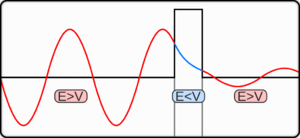I'm assuming the 'amplitude' is kind of like the MeV it has on it, so could be seen as a product of the voltage applied to that electron in a field.
But how can it 'lose' volts when passing the barrier, but still have the same energy as a whole? Does it increase the frequency in proportion to the voltage decrease?

